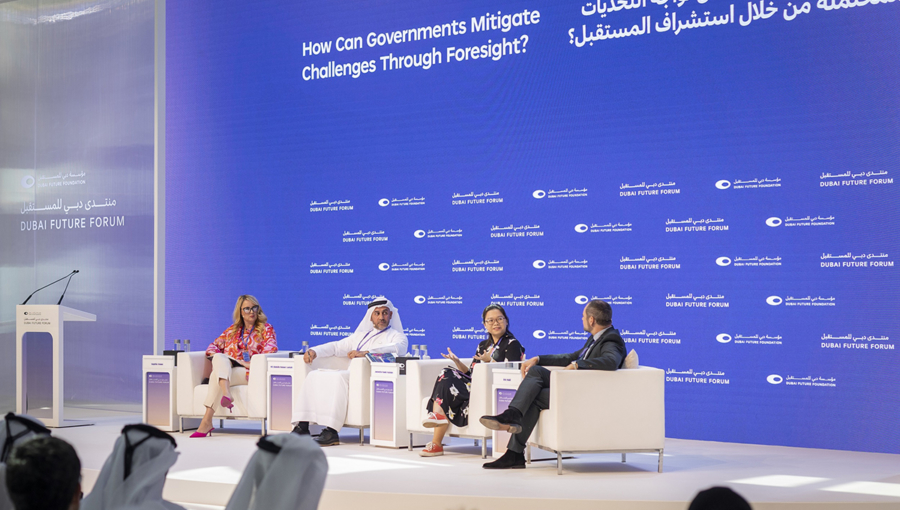Experts highlight the importance of embracing strategic foresight to build resilient and future-proof policy
The UAE and Dubai’s success reflect the importance of the country’s vision to co-create the future and it is imperative that governments should embrace strategic foresight, earn the trust of its people and partners to achieve long-term sustainable growth, said His Excellency Abdulla Nasser Lootah, Director General, Prime Minister’s Office – UAE at the Dubai Future Forum today.
HE Abdulla Lootah was speaking at a panel discussion on ‘Future Proofing Risks’ at the Dubai Future Forum. The panel also included Sophie Howe, Future Generations Commissioner for Wales, and Jeanette Kwek Huixian, Head – Centre for Strategic Futures, Prime Minister’s Office – Singapore. The panel was moderated by Eric Noël from the ‘Canada Towards 2030’ Project.
HE Abdulla Lootah emphasized that UAE and Dubai have always believed in dreaming big. “When we think of governance, we think of the future and envisioning a destination like no other. We commit to it and deliver. In the UAE, our scenario planning is always centered on co-creation. For instance, our UAE Centennial Plan 2071 involved everyone – from leadership, experts, government employees, to schoolchildren. We believe in this philosophy, where the leadership’s vision and our people are at the core of development.”
Governments should always think ahead, and strategic foresight is imperative, he added. “The culture and leadership are the main pillars of Dubai’s and the UAE’s success. The UAE’s leadership has always believed in forward-thinking. We had our e-learning ecosystem ready in 2000. When COVID-19 hit the world, our schools and universities were ready. His Highness Sheikh Mohammed Bin Rashid Al Maktoum, Vice President and Prime Minister of the UAE and Ruler of Dubai, always says that we are in the business of ‘serving people’. For us, the future is limitless and for all of us to conquer – all we need is to think positive, and opportunities are there for us to make a difference.”
Speaking during the panel discussion, Sophie Howe, Future Generations Commissioner for Wales, emphasized the importance of legislation to safeguard future generations. “Wales was the first country in the world that enacted a law called the Well-Being of Future Generations Act in 2015. We are committed to long-term goals, which accelerate the country’s progress. It is all about integrating the holistic vision for the country’s future and involving citizens in co-creating solutions. Embracing a strategic foresight is vital for future generations, and the United Nations is also contemplating adoption of the model globally. However, legislation is only the starting point,” she said.
Jeanette Kwek Huixian, Head – Centre for Strategic Futures, Prime Minister’s Office Singapore, said: “Planning for the future is critical for governments and scenario planning is tremendously helpful. The Centre for Strategic Futures is a manifestation of how the Singapore government institutionalizes foresight, decision-making and preparing a toolkit for the future. We connect ideas to have a broader global perspective and look at the world through a new lens to think and act differently. The future is exciting.”
The Dubai Future Forum, running from 11-12 October at Dubai’s Museum of the Future, is the world’s largest global gathering of futurists. It is hosting more than 400 international participants including technology experts, scientists, innovators, and specialists in various high-skilled fields to exchange knowledge and create a global platform to discuss and debate the future.
Organized by the Dubai Future Foundation, the Dubai Future Forum has brought together more than 70 speakers and 45 global institutions such as the Organization for Economic Co-operation and Development, the Future Today Institute, the Data Trusts Initiative, the Future of Humanity, the Social Design Institute, the Middle East Institute, EY, Khalifa University, and the Regulations Lab.
